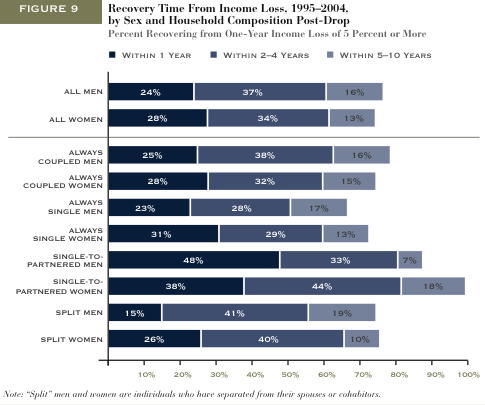Matthew Yglesias featured two figures from the Pew Economic Mobility project. They show how long different types of people tend to take to recover from income loss (within 1 year, 2-4 years, or 5-10 years).
This figure shows that people who are older, have more education, or are poor, working, or middle class have a harder time recovering from tough economic times:

This figure shows how marital status is related to recovery. Most dramatically, people who get married before recovering financially (especially men), women who split with a partner, and women who are single have a more difficult time recovering.

Something to consider: As several commenters noted, I’m not sure how they defined “recovery” from income loss. If you never made a lot of money to begin with, does recovery simply mean returning to a state of low income? Then, does the income for an initially high income person need to return to its high state for it be counted as a “recovery”?
(Just FYI: I revised my interpretation of these figures. Thanks to the early commenters who noticed I’d misinterpreted. It was really late at night when I wrote this post!)
—————————
Lisa Wade is a professor of sociology at Occidental College. You can follow her on Twitter and Facebook.

Comments 9
Carla — June 21, 2009
Er, maybe I just can't read this graph, but it looks to me as if it is saying blacks have an easier time recovering than whites...More blacks recover within the first year, and a greater number of blacks than whites recover within ten years. Perhaps it's because whites tend to earn more, making it more difficult to recover; but I don't see how you can read this graph and see that it is more difficult for blacks to recover.
I could be totally wrong and be reading this incorrectly. If I am, please correct me.
misti — June 21, 2009
I came to say the same thing as Carla. It looks like people who have a higher education or have had more time to learn from their past mistakes recover much faster. That means older people and people who were already making less money (of course, this could be tangled up with the fact that the lost income of 1 year for a poor person is a smaller quantity than that of a rich person).
Regarding the second figure, it looks like people who marry while in the midst of financial trouble GREATLY benefit from having someone to help shoulder the burden of the making up the lost income. This actually makes a lot of sense, logically.
Tamara — June 21, 2009
the "blacks earn less to start with" might be corroborated by the quintile breakdown - the lower the initial salary, the faster the recovery.
Audrey — June 21, 2009
I, too, get almost the opposite view from this graph.
Taken as a whole the "older" (41-48!) people do appear to be less likely to recover within 10 years, but more likely to recover within a year. More educated people aren't *that* much more likely to have recovered within 10 years, but much more likely to recover within a year.
And as Tamara said: "the lower the initial salary, the faster the recovery"
"Most dramatically, people who get married before recovering financially (especially women) have a more difficult time recovering"
Um, actually, single-to-partnered people seem to be the most likely to recover within one year and over time, although the men more than the women.
Lisa Wade, PhD — June 21, 2009
Thanks everyone! I revised the interpretation and put a note in about what "recovery" might mean.
Dubi — June 21, 2009
I fail to see the revision. You still claim educated people have a harder time, even though have a BA gives you a 30% chance to recover within a year, as opposed to 21 for high-school or less. Same goes for age (30% for over 40 as opposed to 21 for the 26-33 years old).
I find it odd that the figures indicate both low levels of education AND being in the higher quintiles as leading to longer recoveries - I'd expect a negative correlation between these two groups.
Also, the similarity of the "always coupled" groups' numbers to the entire population's leads me to wonder about the n values for each of the groups (as well as the total). If the large majority fall into that group, that's a significant piece of information to consider.
Also, it's interesting that, at least for men, splitting up is a bad choice. That's surprising (to me), and I really would like to hear theoretical explanations for that.
bluey512 — June 22, 2009
It doesn't look revised to me either. Also, the graphs show "Percent Recovering from One-Year Income Loss of 5 Percent or More," so that's what "recovery" means.
Interesting graphs! Interesting how marriage helps both parties, but the men do even better than the women.
Shad — September 14, 2023
I think my recovery began when my investments in NFTs began to bring me income. By the way, if you want to invest in NFTs, but are worried about the security and authenticity of digital assets, I recommend learning more about the wakweli protocol wakweli.com, which allows users to purchase genuine NFTs and be sure that they own the rights to the asset.
Jacson Combos — March 13, 2025
When you are looking for a reliable partner to get a loan, it's important to find a company that provides transparent and favorable conditions. Birch Lending offers a wide range of financial services focused on the convenience of customers. If you have questions or need additional information, you can contact birch lending phone number to quickly get help and clarify all the details.